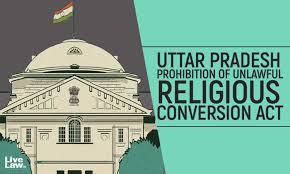
Uttar Pradesh Prohibition of Unlawful Religious Conversion Act, 2021
Uttar Pradesh Prohibition of Unlawful Religious Conversion Act, 2021
GS-2: Indian Polity
(IAS/UPPCS)
Relevant for Prelims:
Uttar Pradesh Prohibition of Unlawful Religious Conversion Act-2021, Inter-Religious Live-In Relationship.
Relevant for Mains:
Uttar Pradesh's Prohibition of Unlawful Religious Conversion Act-2021, arguments in favor and against it, Conclusion.
19/04/2024
Source: IE
Why in news:
Recently, the Allahabad High Court refused to quash an FIR against a Muslim man in an interfaith live-in relationship, citing the Uttar Pradesh Prohibition of Unlawful Conversion of Religion Act, 2021.
Uttar Pradesh Prohibition of Unlawful Religious Conversion Act, 2021
- This is an anti-conversion law enacted by the state government, applicable in Uttar Pradesh.
- In 2021, this Act, passed by the Uttar Pradesh Assembly, replaced the Uttar Pradesh Prohibition of Unlawful Religious Conversion Act, 2021, which was promulgated in November 2020.
- The ordinance was approved by the Uttar Pradesh State Assembly on November 24, 2020, and then approved by the state Governor Anandiben Patel on November 28, 2020.
Major provisions:
- This Act provides for prohibition of unlawful conversion from one religion to another by misrepresentation, force, undue influence, coercion, inducement or by any fraudulent means or by marriage.
- Conversion done by formalizing a marriage or relationship will also qualify as illegal conversion under the Act.
- Section 4 of the law states that “any aggrieved person” or his relatives can file an FIR for illegal conversion.
- Punishment: The standard punishment is imprisonment of 1-5 years and a fine of not less than Rs 15,000.
- If the victim is a woman, a minor or a person belonging to a Scheduled Caste or a Scheduled Tribe, the punishment increases to 2-10 years with a minimum fine of Rs 25,000.
- In cases of mass religious conversion, the punishment is 3-10 years and the fine is at least Rs 50,000.
- Process of conversion: For this, the person converting will have to submit two declarations to the District Magistrate.
- The first declaration must state that the person wishes to change his religion without any force, pressure, undue influence or inducement.
- The Magistrate will then ensure that a police investigation is conducted to determine the “real intention” of religious conversion.
- The second declaration will include details such as date of birth, permanent address, father/husband's name, former religion, the religion to which the person is converting, and details of the conversion ceremony.
- After submitting the second declaration, the District Magistrate will put a copy of it on the notice board, so that the public can register objections, if any, to the conversion.
Arguments for and against the feasibility of this act
Arguments in favor of the law:
- Prohibition on forced conversions: The primary objective of this Act is to prevent forced conversions carried out through force, fraud or inducement.
- Such conversions often exploit vulnerable individuals, especially women and members of marginalized communities, so this legislation is necessary to protect their rights and autonomy.
- Preservation of social harmony: Regulating religious conversion helps in maintaining social harmony and preventing tension between different religious communities.
- Deterrent against conversion rackets: This Act acts as a deterrent against conversion rackets and fraudulent religious organizations that exploit individuals for financial or other gains.
- Promoting religious freedom responsibly: The Act is seen as a balanced approach to protecting religious freedom as well as preventing abuse and ensuring that conversions are carried out in an ethical and transparent manner.
- Support of public opinion: The enactment of the law reflects the sentiments and concerns of a significant section of the population in Uttar Pradesh, where issues related to religious conversion have been controversial.
Arguments against the law:
- Constitutional Concerns: The law violates fundamental rights guaranteed by the Indian Constitution, such as the right to religious freedom and the right to privacy.
- The state does not have the right to regulate a person's choice of religion.
- Ambiguity in definitions: The Act has been criticized for vague definitions of terms such as "coercion," "fraud," and "inducement," which can lead to arbitrary interpretation and misuse by law enforcement agencies.
- Impact on inter-religious relations: This law can be misused to target interfaith couples, especially those in Hindu-Muslim relationships, by accusing one party of forcing the other party to convert through force or fraud.
- Burden of proof: The Act places the burden of proof on the accused, requiring them to prove that the conversion was not done through coercion, fraud or inducement.
- This reversal of burden of proof is seen as unfair and against the principles of natural justice.
- Social Polarization: The enactment of such laws is likely to increase social tensions and polarize communities on religious lines, which may lead to increased communal disharmony.
Way forward:
- The government enacting such laws needs to ensure that they do not limit the fundamental rights of any individual nor do they harm national unity; For such laws, it is very important to strike a balance between freedom and malicious conversion.
- Despite these challenges and criticisms, the Uttar Pradesh government has defended the law, arguing that it is necessary to prevent forced conversions and protect the rights of individuals to practice their religion freely.
- The ultimate resolution of these challenges may depend on judicial interpretation and possible amendments to the Act.
-------------------------------------------
Mains Question
Explain the major provisions of Uttar Pradesh Prohibition of Unlawful Religious Conversion Act, 2021.
Write your arguments in favor and against the feasibility of Uttar Pradesh Prohibition of Unlawful Religious Conversion Act, 2021.